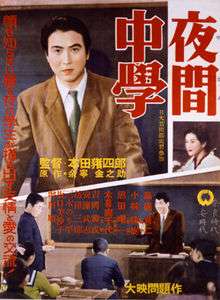Night School (1956 film)
Night School (夜間中学, Yakan chūgaku) is a 1956 Japanese film directed by Ishirō Honda.
| Night School | |
|---|---|
 Original Japanese movie poster | |
| Directed by | Ishirō Honda |
| Screenplay by | Yoko Mizuki |
| Starring |
|
Production company | Nihon University College of Art |
| Distributed by | Daiei Film |
Release date |
|
Running time | 44 minutes[1] |
| Country | Japan |
Cast
- Okinari Yoshioka as Senta
- Michiyo Kogure as Senta's mother
- Katsuyuki Nomura as Senta's younger brother
- Takeshi Ando as Ryohei
- Jūkichi Uno as Ryohei's father
- Mitsue Hino as Ryohei's mother
- Teiji Takahashi as Daytime Teacher
- Keiju Kobayashi as Nighttime Teacher
- Norihei Miki as a train passenger
- Saburo Boya as a train passenger
- Yutaka Nakayama as a train passenger
Production
Night School was director Ishirō Honda's only film ever directed outside of Toho.[2] The film was among the first about the topic of night schools.[2] The original idea for developing a film around night schools was from Kanesaku Toda, a Toho staff member who approached Honda and other ex-Nichidai men.[2] The team got the rights to the short story by Teiji Seta titled "Mail Desk" (Yubin zukue) which appeared in the children's magazine Boys and Girls.[2] Among the crew was Yoko Mizuki as the screenwriter, and other Nichidai grads including Keiju Kobayashi and Jukichi Uno who starred as a teacher and a student's father.[2] The film was produced by Nihon University College of Art with a low budget.[2] Most actors on set worked without pay.[2]
Honda and the films producers submitted Night School to the Japanese government's education department, hoping to secure a seal of approval to get the film approved for families and students.[2] The government advised Honda to change the title due to a stigma surrounding night schools, which Honda declined leading the funding being denied.[2]
Release
Night School was acquired by Daiei Film and distributed as a second feature on April 18, 1956.[2][1]
The film was not screened for decades.[3] It was revived at the 2009 Yamagata International Documentary Film Festival retrospective titled "The Man Who Shot Godzilla".[2] Following the screening, a panel discussion was held with Shusuke Kaneko and Honda's son Ryuji.[3]
References
Footnotes
- Ryfle & Godziszewski 2017, p. 301.
- Ryfle & Godziszewski 2017, p. 121.
- Ryfle & Godziszewski 2017, p. 122.
Sources
- Ryfle, Steve; Godziszewski, Ed (2017). Ishiro Honda: A Life in Film, from Godzilla to Kurosawa. Wesleyan University Press. ISBN 0819577413.CS1 maint: ref=harv (link)